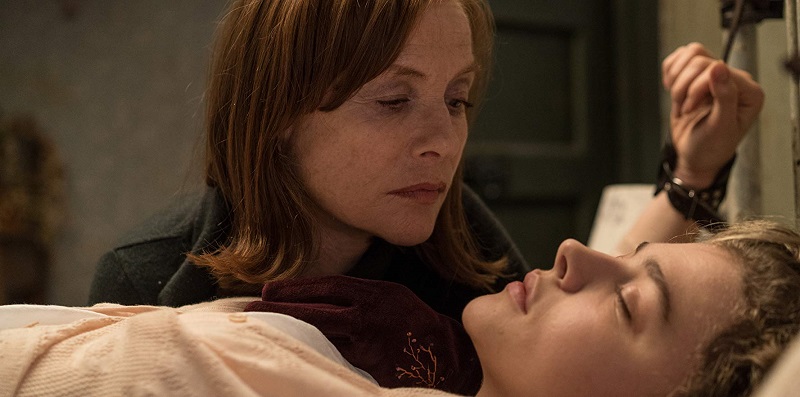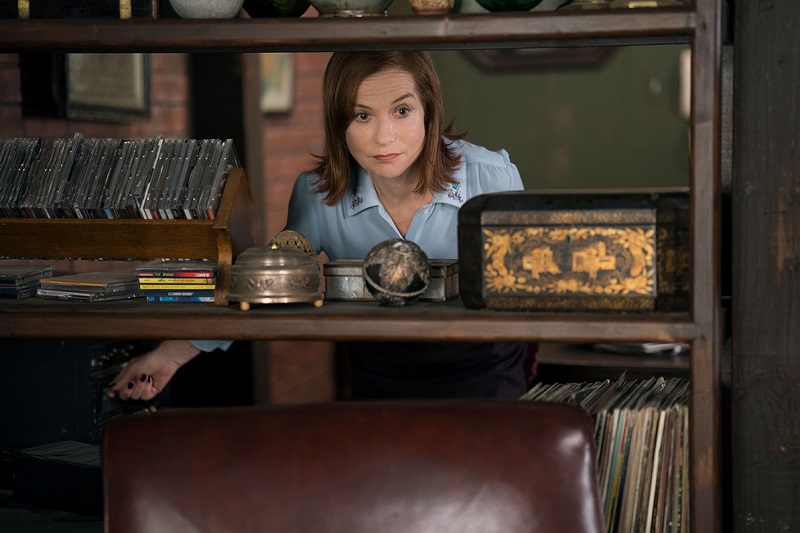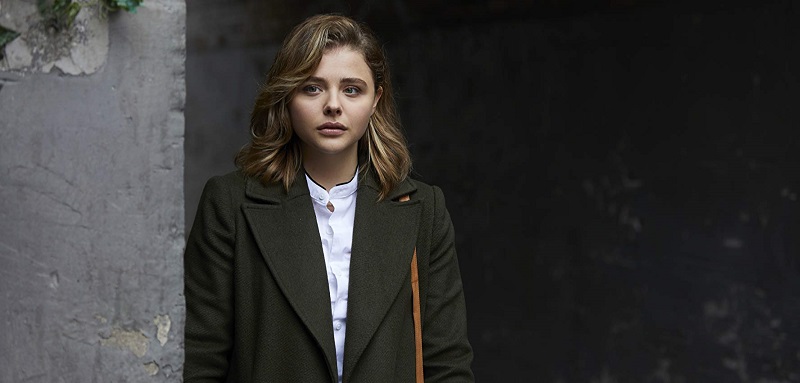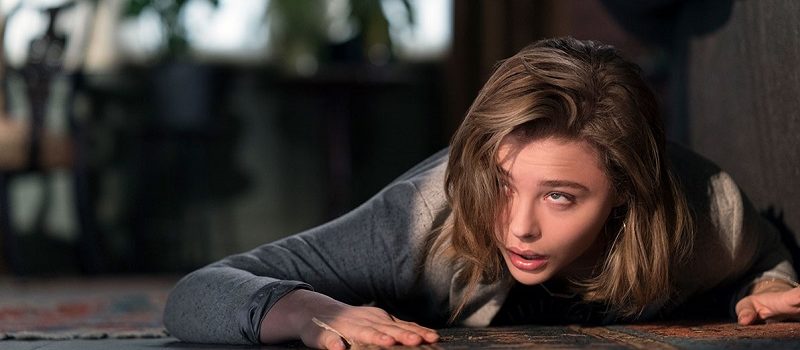Neil Jordan has a new film out in Greta. Normally, that would result in this writer running—not walking—to the cinema. The man who helmed such stunning works as Michael Collins, The Crying Game and The End of the Affair is a filmmaker whose touch is ever-present in his films. That is so not the case with Greta as the film is more of a lesson in bad cinematic decision making than the thriller it paints itself to be.

Chloë Grace Moretz stars as Frances. She has recently lost her mother and moved from Boston to New York City to live with her BFF, Erica (Maika Monroe) in a loft we all wish we could afford. When she finds a purse left behind on the subway, Frances looks inside and finds an ID and some money. Ever the good soul, she returns it to the owner and thus begins her Greta journey.
At first, Greta (Isabelle Huppert), comes off as a harmless older woman who is drowning in loneliness. Frances is lost without her mother, and probably didn’t realize how much until she meets the titular character. The two immediately hit it off and become fast friends, but more… Greta truly is filling a role as nurturing soul that Frances’ late mother previously occupied. Her roommate Erica thinks the relationship is a little odd, but given Monroe’s characterization of the roommate, it’s easy to dismiss her feelings as being ageist at the most and being a self-centered millennial at the least. Then, as shown in the trailer—so this is no spoiler—Frances is over for dinner with Greta and while looking for candles, discovers a drawer full of the exact bags as the one she found on the subway, each with an ID and some money. Needless to say, her appetite has gone out the window, along with her trust in this stranger who she let into her guarded and maternally wounded heart.
Jordan co-wrote the script with Ray Wright (Case 39). If witnessing the film gives off the impression that Jordan mailed it in from a helming point of view, as a viewer it is insanely infuriating to see he also had a hand in the lazy script. Take this moment from Greta as an embodiment of this inane storytelling effort. Frances already knows that Greta is essentially a stalker who could be dangerous. Yet she returns to the woman’s apartment building to “check on her dog.” When she rides up to the building on her bike, she simply places it up against the structure and walks down the alley towards Greta’s door. What person in New York City would leave a bike unlocked on a busy street? Or ever! That scene alone gave off major inept direction vibes but learning that Jordan had a hand in the script as well, either Jordan or Wright could have added a simple action descriptor such as, “Frances locks her bike to a pole and cautiously saunters down the alley towards Greta’s abode.” Even if that wasn’t in the script, the director should have called an audible while filming and had Frances secure the bike. It may seem like a nit-pick on my part, but it is emblematic of the entire effort of Wright and especially Jordan.

Don’t get me started on the question of what is Frances even doing there in the first place! Of course, that is a classic horror/thriller movie trope—the returning to the scene of the crime when everyone in the right mind would never do such a thing. That is just one example. There are dozens of moments strewn throughout Greta that elicit eye rolls and inquiries such as, “how did this thing get green-lit?”.
Top billing here goes to Moretz, who I believe to be a solid actress. She was the only saving grace in the 2013 Carrie remake. Her co-star is held in even higher esteem. Huppert (an Oscar nominee for 2016’s Elle) has always commanded your attention, no matter the film. She (normally) elevates material. She does wonders with what she is given in this excuse for a thriller. She turns cinematic excrement into a soufflé at times and allows the audience to drift back from “get me out of here” to compelling chills. Greta speaks wonders about the French actresses’ talent that she can manage to be a bright light in an otherwise grim tale. The viewer feels for her. Who cannot identify with the perils of loneliness and how someone living in a city of 8.6 million could feel like they reside on a deserted island? In the hands of Huppert, our antagonist possesses something oddly out of place in a thriller of this ilk… compassion.

Moretz too tries to make the most of the disaster that is Greta. Even her budding screen charisma never takes hold and is allowed to glow. In this instance, her thespian gifts do not compel us to be vested in her fate while in the crosshairs of someone who is clearly dangerous and psychotic. Even Meryl Streep in her 20s could not have pulled off that kind of movie miracle if Greta had been produced in the 70s.
One must wonder what it was about this story by Wright that compelled Jordan to co-write the script and take on the engulfing effort that is directing a major motion picture. A placid thriller is always such a disappointment because this genre of film can produce some of our most endearing movie moments. When laziness and lack of caring (or so it seems by the viewer) permeates a milieu that is supposed to have you white-knuckling the armrests, one starts to critique throughout. That is exactly what occurs during Greta. Another perfect example is the arrival of a frequent Jordan collaborator, Stephen Rea (The Crying Game) in the third act. He had been hired by Frances’ father, Chris (Colm Feore), to track down his missing child. Rea’s Brian somehow wins the private detective lottery and finds Greta’s home and despite the warning signs littered throughout his visit, he never thinks to either get the hell out of there and call the cops or confront his host about Frances’ whereabouts. Really? I mean … really?!
Grade: D

